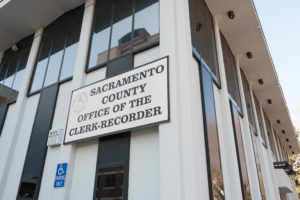
Here’s a number for you, 3,141. That’s the number of counties, boroughs, parishes, census areas, and independent cities across the US. That’s a lot of recorder’s office to deal with. And each has its own specific requirements and fees. To make matters worse, recorder’s can be tricky to deal with, and often nit-pick every aspect of your document. You should always contact the appropriate recorder’s office ahead of time to nail down the specifics. With this list of what to ask the county recorders, your path to a recorded lien will be as smooth as possible.
In over 10 years of business helping construction get paid in all 50 states, we’ve interacted with more than our fair share of county recorders and clerks. However, just like the underlying mechanics lien laws themselves, county recorders and clerks are continually updating and changing their regulations which can include anything from the mandating the margin size on the actual paper of your lien filing, to the filing fees required, and everything in between.
Thankfully, since Levelset is in nearly constant communication with the county recorder offices across the country, we do a pretty good job of staying up-to-the-minute on all of shifting lien filing requirements. But not only are we good at keeping our information up-to-date, what we’ve really become experts in is asking the right questions. Here’s a list of the essential questions to ask the county recorder before filing your mechanics lien claim.
1. Is this the correct office to record a mechanics lien?
First and foremost, you should clarify whether the office you contacted actually records mechanics liens. Many times the number you find may connect you to the courthouse, town hall general operator, or any other department that may not be able to help you. To make matters even more confusing, you may not even be looking for the county recorder’s office. For example, Illinois liens are filed in the Recorder of Deeds Office, and Pennsylvania liens are filed with the Prothonotary. Reaching the wrong office can lead to confusion and multiple transfers. Take the hassle out of the process from the start, and simply ask if it’s the proper office for recording liens.
County Recorder’s Offices in All 50 States
2. What is your turnaround time?
Mechanics liens aren’t always automatically recorded when the claim is sent to the recorder’s office. Roughly speaking, it can take about 2 weeks (or as much as five weeks!) from the moment the office receives the claim to the time the document is actually recorded. And this is before they’ve even evaluated the form to see if they will accept it or not. Ask what the expected turnaround time is, or if they have a large backlog. Based on this answer you can rush the delivery or hire a courier to take it down to the office in person. This is one of the main reasons why claimants need to plan ahead, and not wait until the last minute to file. Thankfully the electronic filing trend is spreading. We’ll touch on this later.
3. What are the filing fees?
Everything in life comes with a price, and mechanics liens are no exception. And the answer you may receive isn’t always as clear as it should be. They may tell you x amount of dollars to file a lien. But is that a flat rate? Or does that just cover the first page? Be particularly persistent when it comes to Massachusetts, which requires two different documents to be filed. A Notice of Written Contract, and a Statement of Account. If the office says it costs $75 to file, clarify whether it’s $75 per document, or $75 total. Quick note: most require these documents to be filed separately. If you get an answer, and you’re still unsure, ask if you can send a “do not exceed check.”
Follow-up question: Do you accept out of state (or personal) checks?
For many contractors, their work isn’t limited to their state. Some accept projects all over the country. If this is the case with you, be sure to ask what form of payment they accept. Many recorders will refuse to accept out of state or personal checks. Some only accept money orders or an attorney check.
Follow-up question: Who do I make the check payable to?
This can vary by state. Some counties in New York required the check to be made out to the “NY County Clerk.” While in Massachusetts, the office will require the check to be payable to the “Commonwealth of Massachusetts.” Ask who the check should be made payable to. After all, you can’t pay for the filing if the office can’t deposit the check!
4. Do we need to include a legal property description?
In roughly 10 states, Michigan for instance, require the full legal property description (LPD) to be included in the lien claim. While others merely require a description that is “sufficient to identify the property.” In other states, while a legal property description isn’t necessarily required, a simple street address won’t suffice. So when in doubt, find that legal property description. The LPD is a series of numbers and letters that indicate where the property is located based on government land surveys. If required, and not included, the office will reject an otherwise valid lien claim.
Follow-up question: If so, then what type of LPD?
If you’ve ever seen a legal property description, you know how long and complicated they can be. Some county offices, particularly in Ohio, do allow for abbreviated LPDs. However, it’s always best practice to add the full description. Also, in states like New York and New Jersey, you’ll also be required to include a block and lot number as well.
5. Are there any specific requirements? (margins, font size, cover letter)
These specific requirements can be particularly vexing and can vary state to state, or even county to county. A claim that may be perfectly filled out can still be rejected if there aren’t the proper margins, font size, or no cover page included. Most counties require 3” at the top of the first page. Just enough room for the recorder’s stamp. But there are other offices that need a half a page worth of space on the first page, or 2 “ at the bottom. As far as font size, it’s typically somewhere between 10 and 12 pt. Be sure to ask and you shouldn’t have any issues.
6. Do you keep the original, or should I provide a copy to be stamped and returned?
You worked hard putting these documents together, and you want a stamped and recorded document to show for it. Make sure to have the recorder return either the original or a stamped copy. It’s probably up to you to determine which, however, recorders are generally not forthcoming with this information without being prompted. If they do keep the original, ask if there is a fee to stamp the copy, and don’t forget to send a self-addressed, stamped envelope so they can mail it back to you.
7. Is there any additional documentation that needs to be included?
“Additional documentation” (around the Levelset office, we also refer to this as “supporting documentation”) can be a wild card that can throw a monkey wrench into the works of many attempted lien filing. And as you can probably imagine, the items in this category can be all over the place. For example, in Tennessee, a “Certificate of Authenticity” must be attached to your lien document.
In New York, not only do you have to make sure that a copy of your lien gets delivered to the required parties utilizing the proper delivery method, your lien filing must include a Notarized Affidavit of Delivery that proves you’ve done it. On the subject of notarization, there are a whole bunch of states that require the lien filing itself to be notarized.
And if you’re filing a mechanics lien in Washington DC, be sure to include your business’ Certificate of Good Standing, along with a copy of your business license for good measure.
8. If I send by FedEx, what address should I send it to?
Don’t get me wrong, there’s nothing wrong with FedEx. But there’s one specific issue. P.O. boxes. There are a fair amount of county offices that use P.O. boxes. The problem is, FedEx doesn’t deliver to P.O. boxes. Don’t blindly FedEx your lien claim to a P.O. address. There’s always an alternate physical address where these documents can be sent. Be sure you get your hands on that address.
9. Do you offer electronic recording?
We’re living in the 21st century. Technology is everywhere! There’s plenty of recorder’s offices that accept lien filings online. Depending on the state and county, this can involve simply registering an account with the office, while others involve registering with a third-party provider; such as Simplifile. This can be a useful option for companies that file multiple property records or mechanics liens. But for smaller companies who only file once in a blue moon, this may not be entirely worth the effort.
The biggest advantage of filing electronically? The claim is recorded on the same day! Thankfully, there are a growing number of counties that are switching over to e-filing. This is great news, and this can decrease the turn-around time from a matter of weeks until minutes. As technology continues its unceasing advance, there will undoubtedly be more counties that adopt this practice.
Stay calm, but persistent
Having your claim rejected can cost you valuable time. Particularly if your back is up against a deadline. Always contact the office ahead of time before filing. Yes, dealing with a county recorder’s office can get frustrating at times. But it’s crucial you get every little detail right. Trust us, we’ve seen it all! We’ve seen filings get rejected for a cornucopia of ridiculous reasons or minor errors. Sometimes it seems that the offices just make up their own rules as they go!
The important thing is to stay calm and remember what you were taught in grade school. There are no stupid questions, only stupid answers. This is no time to be shy or cautious. Be persistent, and get the information you need. After all, it’s your money on the line here. Just reassure the recorder’s office that you’re asking all these questions to make their job (i.e. recording your lien) easier. And at the end of the day, if you don’t want to deal with it, you can always file your documents with Levelset.




